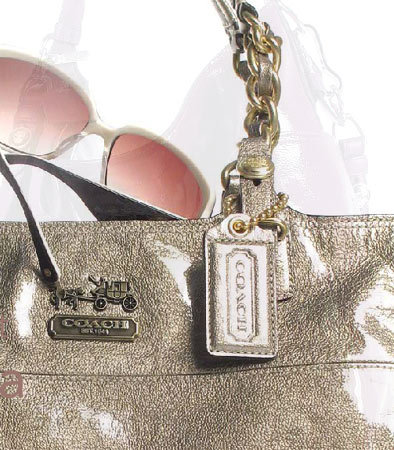Reuters
Jul 28, 2009
Coach fourth quarter profit matches view; unveils new line
Reuters
Jul 28, 2009
By Ben Klayman
CHICAGO, July 28 (Reuters) - U.S. leather goods company Coach Inc (COH.N) reported lower quarterly profit on Tuesday 28 July, matching expectations, but shares fell 5.6 percent as investors worried about increased investments, including the launch of a new brand by its creative director Reed Krakoff.
 www.coach.com |
Wall Street Strategies analyst Brian Sozzi also cited a lack of a fiscal 2010 forecast and weaker-than-expected gross profit margins for the shares' decline.
"With increased investment spending in China, sales volatility here at home, lower-price points within the overall assortment and increased factory channel sales mix, it appears returns will take a hit," he said. "The gross margin really missed consensus by a wide margin."
Coach, which makes high-end handbags and other accessories, said in April that sales at its North American stores had begun to stabilize. The comment was rare good news for luxury goods makers, whose sales and profits have plunged as consumers cut back in the recession.
Chief Executive Lew Frankfort said the trend was continuing, citing improvements in Coach's full-price business in North America and Japan in July.
"It's early days for our new quarter, but four weeks into it, we definitely see a sequential improvement in traffic," he said in a telephone interview.
Frankfort said the economy is still clearly in a severe recession and consumers will be extremely cautious for the rest of the year, but added that Coach will outperform other brands as it rolls out the Krakoff line and ramps up its new, and very popular, Poppy line of less expensive bags.
SALES FALL
Net income fell to $145.8 million, or 45 cents a share, in the fourth quarter ended June 27, from $213.5 million, or 62 cents a share, a year earlier.
Excluding one-time items, profit was 43 cents a share, matching what analysts polled by Reuters Estimates had expected.
Sales slipped less than 1 percent to $777.7 million. Sales at North American stores open at least a year, or same-store sales, fell 6.1 percent.
Coach operates factory stores where prices are lower, but its full-priced stores have avoided discounts in a strategy that has preserved the status of its brand but hurt sales.
To appeal to more cost-conscious shoppers, Coach is introducing more bags in the $200 to $300 range, and has said the move should reduce overall prices by 10 to 15 percent.
In June, Coach launched the Poppy line, which feature bright youthful colors and graphic prints. The average price of a Poppy bag is $260, about 20 percent less than the usual Coach purse. It said there has been a strong initial response to the fall collections, especially Poppy.
"Poppy is blowing out," Frankfort said.
Coach will open Poppy stores in Japan and possibly the United States at some point, Frankfort said on a conference call, adding it is also developing a few stand-alone men's shops in Japan.
The company also announced a new stand-alone brand, Reed Krakoff -- named for the creative force responsible for turning around the once-staid leather goods maker -- it will launch in the fall. It will offer women's clothing with average prices ranging from $495 to $1,195, as well as handbags, accessories, footwear and jewelry.
The new brand will initially be offered in a small number of stand-alone stores in the United States, Japan and Hong Kong, as well as in limited distribution in specialty stores, Frankfort said. It may eventually expand into men's categories.
Coach also accelerated plans for China, where same-store sales grew at a double-digit rate in the quarter, saying it now expects to open about 15 new stores, up from about 10 previously targeted. Over the next five years, it expects to open at least 50 stores in China.
Shares of Coach fell $1.58 to $26.85 a share in trading on the New York Stock Exchange. (Reporting by Ben Klayman; Editing by Lisa Von Ahn and Jeffrey Benkoe)
© Thomson Reuters 2024 All rights reserved.

























